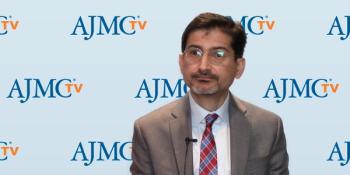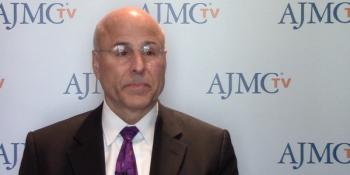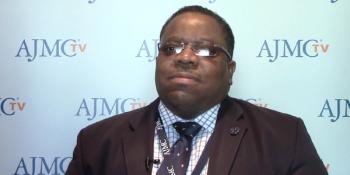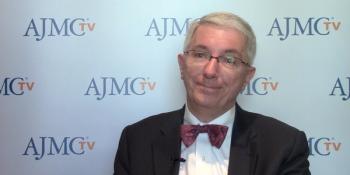
This fall's ACO & Emerging Healthcare Delivery Coalition

This fall's ACO & Emerging Healthcare Delivery Coalition

The perspective of the decision maker in healthcare affects the meaning of value and the US healthcare system is still trying to figure out how to measure value, said Darius Lakdawalla, PhD, Quintiles Chair in Pharmaceutical Development and Regulatory Innovation at the School of Pharmacy at the University of Southern California.

Medical bankruptcy is indefensible and even if patients are willing to bankrupt themselves to purchase a cure, doesn't mean that is how pricing and reimbursement of treatments should be handled, said Darius Lakdawalla, PhD, Quintiles Chair in Pharmaceutical Development and Regulatory Innovation at the School of Pharmacy at the University of Southern California

Value frameworks are tools used to clarify cost-benefit tradeoffs in healthcare decisions, which means they can look very different depending on their intended audience, according to Clifford Goodman, PhD, moderator at the ACO Coalition spring live meeting in Scottsdale, Arizona, and senior vice president and director at the Center for Comparative Effectiveness Research at the Lewin Group.

In the 180-plus years Daughters of Charity has been in New Orleans, the health system has implemented a number of innovative ideas, from air-conditioned hospitals to community health networks, according to Michael Griffin, president and CEO. The future is looking even brighter as more patients become insured and gain access to care, he added.

CareMore is beginning to form innovative partnerships with companies like Lyft, while also strengthening its internal ability to provide more outreach, according to Sachin H. Jain, MD, MBA, president and CEO. Jain said that CareMore’s prepaid model allows it to fully manage every dollar it receives.

Data breaches and cyberattacks can have costly and damaging consequences for healthcare organizations, but there are some steps that can be taken to mitigate the risk and impact of these incidents, explained Lee Barrett, executive director of the Electronic Healthcare Network Accreditation Commission.

By aligning payers to care about population health and social determinants of health, it will help improve the health of the community as a whole, said Michael Griffin, president and CEO of Daughters of Charity Services.

Though no country has a drug pricing system that would work perfectly in the United States, there are many components that could potentially be adapted for use here, like strengthened price negotiation abilities, said Clifford Goodman, PhD, moderator at the ACO Coalition spring live meeting in Scottsdale, Arizona, and senior vice president and director at the Center for Comparative Effectiveness Research at the Lewin Group.

CareMore has launched an integrated delivery model that provides primary care to patients while at the dentist’s office, with the idea of maximizing the value of each encounter with the healthcare system, explained Sachin H. Jain, MD, MBA, president and CEO.

According to its CEO and president Michael Griffin, Daughters of Charity is undertaking a number of projects that use technology to improve care coordination and communication.

The shift to value-based payment models necessitates greater exchange of data and analytics, including the use of personal health information (PHI), said Lee Barrett, executive director of the Electronic Healthcare Network Accreditation Commission. This heightened amount of data being transferred makes it essential for organizations to have procedures in place that mitigate the risk of data breaches or attacks.

Nearly 12 years after Hurricane Katrina caused devastating damage and flooding in New Orleans, the city has still not completely recovered, although there is now a stronger infrastructure for primary care, according to Michael Griffin, president and CEO of Daughters of Charity Services.

Constraining the cost of prescription drugs is a politically popular idea, but the same objective might be accomplished through evidence-based decision support for setting appropriate drug prices, according to Clifford Goodman, PhD, moderator at the ACO Coalition spring live meeting in Scottsdale, Arizona, and senior vice president and director at the Center for Comparative Effectiveness Research at the Lewin Group.

While the political landscape is changing and new policies are being debated, lawmakers of both political parties can agree on the common goal of improving disease management for costly patients with complex health needs, according to Sachin H. Jain, MD, MBA, president and CEO of CareMore.

As healthcare organizations seek to expand the scope of data that patients can access, they must remain vigilant about cybersecurity and monitor the risk of data breaches and attacks, said Lee Barrett, executive director of the Electronic Healthcare Network Accreditation Commission.

Ongoing legislative developments and the latest experiences with implementing alternative payment mechanisms are just some of the reasons Clifford Goodman, PhD, senior vice president and director at the Center for Comparative Effectiveness Research at the Lewin Group, is looking forward to the fall meeting of the ACO & Emerging Healthcare Delivery Coalition.

Among the sessions of the ACO & Emerging Healthcare Delivery Coalition Spring 2017 meeting was a panel discussion on population health strategies. According to Sachin H. Jain, MD, MBA, president and CEO of CareMore, the discussion was optimistic about the future of the healthcare system, particularly due to the new therapies and technologies that are being developed.

Amidst a turbulent political climate as Republicans endeavor to enact the American Health Care Act, the shift to value-based contracts will continue due to the other market forces in play, explained Clifford Goodman, PhD, moderator at the ACO Coalition spring live meeting in Scottsdale, Arizona, and senior vice president and director at the Center for Comparative Effectiveness Research at the Lewin Group.

Given the chance to suggest a healthcare policy change to lawmakers, Michael Griffin, president and CEO of Daughters of Charity Services, would recommend making Medicaid available to all Americans. Griffin said this would reduce cost while greatly expanding access.

As the amount of healthcare data and information exchange continues to grow, so does the threat of data breaches and cyberattacks, according to Lee Barrett, executive director of the Electronic Healthcare Network Accreditation Commission.

The future of healthcare should be taking care of patients in the context of their lives, whether that is addressing their hunger, transportation needs, or loneliness, explained Sachin H. Jain, MD, MBA, president and CEO of CareMore.

As they take on risk, health systems have to address factors that contribute to rising rates of obesity, diabetes, or dementia-and they are doing so in novel ways.

A day after House Republicans voted to pass legislation that repeals and replaces large parts of the Affordable Care Act, Avik Roy, Forbes opinion editor and president of the Foundation for Research on Equal Opportunity, outlined what Republicans are trying to fix. After his presentation, he joined a panel discussion on what impact the American Health Care Act will have.

Darius Lakdawalla, PhD, explains that moving to value-based pricing system can be thorny when not everyone has the same definition of value.

At the ACO & Emerging Healthcare Delivery Coalition®, people from around the country who are successfully creating new ways to deliver value-based care come together to share learnings and best practices for attendees to take back to the office on Monday, explained Clifford Goodman, PhD, moderator at the ACO Coalition spring live meeting in Scottsdale, Arizona, and senior vice president and director at the Center for Comparative Effectiveness Research at the Lewin Group.

Healthcare organizations really need to be careful that the protected health information flow is safe and there are no vulnerable spots where that information can be accessed and cause a HIPAA violation, explained Lee Barrett, executive director of the Electronic Healthcare Network Accreditation Commission.

Panelists on day 1 of the ACO & Emerging Healthcare Delivery Coalition® discussed the challenging work of creating public-private partnerships, and how these initiatives can address issues to improve the health of a population.

The rise of accountable care means health systems have more opportunities to share patient information, increasing the opportunities for hackers to penetrate their systems. The question isn't whether a health system will have a breach but when and how it will respond, experts said.

The current form of the American Health Care Act would greatly impact patients in New Orleans, where a high percentage of people have chronic diseases that count as preexisting conditions, explained Michael Griffin, president and CEO of Daughters of Charity Services.

259 Prospect Plains Rd, Bldg H
Cranbury, NJ 08512
© 2025 MJH Life Sciences®
All rights reserved.
